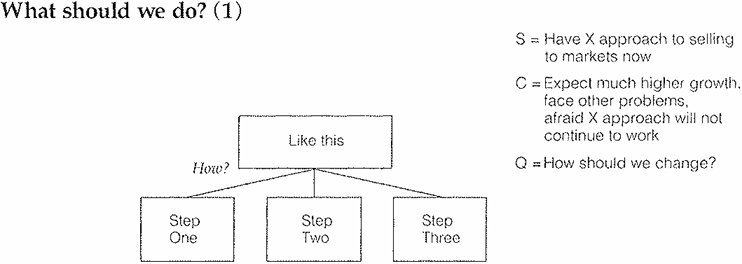
MOVE TO THE INTRODUCTION
 المؤلف:
BARBARA MINTO
المؤلف:
BARBARA MINTO
 المصدر:
THE MINTO PYRAMID PRINCIPLE
المصدر:
THE MINTO PYRAMID PRINCIPLE
 الجزء والصفحة:
133-8
الجزء والصفحة:
133-8
 2024-09-18
2024-09-18
 806
806
MOVE TO THE INTRODUCTION
As you have seen, the Problem Definition Framework for the most part lays out the problem elements in the order in which they can most easily be used in the introduction. You simply move from left to right and down. The last thing known by the reader is always the Complication.
Following are examples illustrating the introduction and pyramid for each of the seven standard questions. These examples are somewhat abstract, in order to emphasize the bare structure, but you can read the full content of each introduction in Appendix B, Examples of Introductory Structures.

This structure is the simplest of all to analyze and write, since the Situation always describes what is going on now, and the Complication is always that the reader is at R1 and wishes to be at R2. This is also the structure used to tell someone how to change or upgrade a system that is presently in operation. In that case, you would have:
Situation Here's how the system works today
Complication It does not do what it is meant to do
Question How do we make it do what it is meant to do?
The plural noun for the Key Line here would be "changes." It differs slightly from the structure you would use if you were telling someone how to do something new, where the plural noun would be "steps."
Situation Here's the activity we are trying to perform
Complication We are not able to perform it
Question How do we create the capability to perform it?
 الاكثر قراءة في Writing
الاكثر قراءة في Writing
 اخر الاخبار
اخر الاخبار
اخبار العتبة العباسية المقدسة


